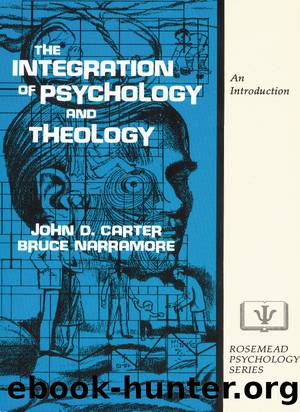The Integration of Psychology and Theology by John D. Carter & Bruce Narramore

Author:John D. Carter & Bruce Narramore [Carter, John D. & Narramore, Bruce]
Language: eng
Format: epub
Publisher: Zondervan Academic
Published: 2018-07-02T00:00:00+00:00
4
THE AGAINST MODEL
In the brief one-hundred-year history of psychology, there have been numerous attempts to relate the facts and theories of psychology to the affirmations of theology. These attempts run the gamut from outright rejection of the notion of integrating two such separate disciplines to some very sophisticated attempts to find common ground and integrable concepts in the statements of psychologists and theologians.
In this and the next three chapters we will attempt to order these diverse approaches and demonstrate how each can be located in one of four general approaches to, or models of, integration. By looking at the presuppositions and perspectives held in common by theorists within each model we can begin to see both the potential and the problems of various approaches to the relationship of psychology and theology. In each chapter we will briefly outline one of the four models of integration and state its basic premises and hypotheses. Then we will illustrate the perspective of that model by citing several representative authors and conclude with a brief summary.
In this way we will attempt to demonstrate how the representatives of each viewpoint approach issues such as the nature and sources of truth, the nature of religious and psychological data, and the possibility of relating these two types of data. It is our belief that some of these approaches are doomed to failure. They can never effect a viable integration because of their built-in presuppositions. Others hold more promise.
In outlining each model, we will present both a secular and a sacred version.1 Since these versions have developed separately, there will be some difference in terminology. Psychologists with an interest in religion have generally been concerned with broad religious phenomena and experience, and, as a result, they have explored the relationship between psychology and religion in general. In contrast, the Christian authors we will discuss generally represent orthodox Christian viewpoints. They have been more concerned with theology and with the nature and effects of Christianity than with religion in general. In spite of these differences, however, it appears to us that there is sufficient similarity in underlying presuppositions to consider the sacred and secular version of each model as two sides of the same coin.
We have chosen to call these models the Against model, the of model, the Parallels model, and the Integrates model.2 We will begin our discussion with the Against model. Although this model represents an extreme viewpoint that is antithetical to the tenets of this book, it does serve as a good reference point from which we can build a comprehensive understanding of the relationship between psychology and theology.
Download
This site does not store any files on its server. We only index and link to content provided by other sites. Please contact the content providers to delete copyright contents if any and email us, we'll remove relevant links or contents immediately.
The Art of Thinking Clearly by Rolf Dobelli(8902)
The 5 Love Languages: The Secret to Love That Lasts by Gary Chapman(8576)
Mindhunter: Inside the FBI's Elite Serial Crime Unit by John E. Douglas & Mark Olshaker(7877)
Becoming Supernatural by Dr. Joe Dispenza(7144)
The Road Less Traveled by M. Scott Peck(6672)
Nudge - Improving Decisions about Health, Wealth, and Happiness by Thaler Sunstein(6669)
Enlightenment Now: The Case for Reason, Science, Humanism, and Progress by Steven Pinker(6436)
Win Bigly by Scott Adams(6345)
Mastermind: How to Think Like Sherlock Holmes by Maria Konnikova(6280)
The Way of Zen by Alan W. Watts(5830)
Factfulness: Ten Reasons We're Wrong About the World – and Why Things Are Better Than You Think by Hans Rosling(4045)
The State of Affairs by Esther Perel(3966)
Gerald's Game by Stephen King(3948)
Man's Search for Meaning by Viktor Frankl(3677)
The Confidence Code by Katty Kay(3599)
Thinking in Bets by Annie Duke(3556)
The Worm at the Core by Sheldon Solomon(2947)
Enlightenment Now by Steven Pinker(2934)
Liar's Poker by Michael Lewis(2834)
